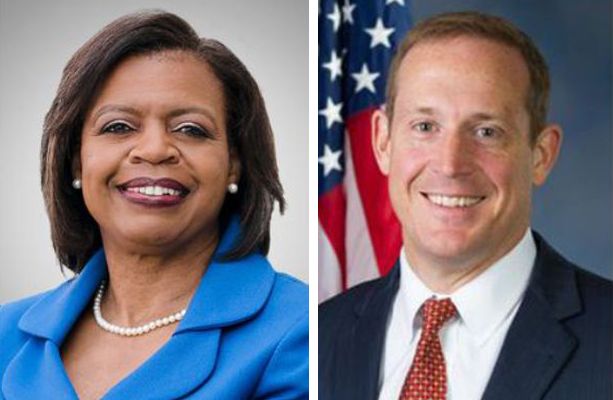By Kirk Ross
Pivotal contest that some had already conceded to the GOP is shaping up to be closer than expected
With less than three months to go before the start of early voting, North Carolina’s closely watched contest for an open U.S Senate seat remains as close as it is contentious.
Going into summer the race between Rep. Ted Budd and former state Supreme Court Chief Justice Cheri Beasley appeared tilted in favor of the Republican.
Between the historic trends that work against the President’s party in first-term midterms and inflation driving down Joe Biden’s favorability ratings, Budd got the nod in national assessments of the race.
But a string of headlines out of the nation’s capital, some hard-line U.S. House votes and lackluster fundraising have put Budd on the defensive and the issue of who will succeed retiring, three-term Sen. Richard Burr in serious question.
Two recent polls from GOP leaning sources put Beasley behind, but still within the margin of error.
Countering the Trump factor with money and energy
“It’s a closer race than I thought it would be at this point,” said Chris Cooper, a political science professor at Western Carolina University. There’s a noticeable difference, he added, in the way the two campaigns have been operating since the May 17 primary.

“Ted Budd has run a quiet campaign. It’s almost bordering on silence,” he said. “Cheri Beasley has sort of moved in the opposite direction after being the silent candidate in the Democratic primary. She’s been waging a strategic campaign and if the polling data are to be believed, then I think it’s worked out to her benefit. This race is too close to call.”
Last year, Budd, now in his third term in congress, had lower statewide name recognition than Beasley. But the early endorsement of former President Donald Trump and an extended primary battle this spring raised his profile.
Trump and Budd appeared together at a rally in Johnston County in mid-April, but the former president hasn’t been back to the state since.
A major rally scheduled for Greensboro on July 15 was canceled in late June when Trump was called to testify in a civil hearing that day.
Cooper said legal entanglements and this summer’s January 6 hearings have damaged the Trump brand, making it riskier for Budd to rely on the former president’s clout.
“There’s no doubt that Trump’s endorsement, got him through the primary virtually unscathed, but we’re in a very different world now,” he said.
Beasley, meanwhile, had built upon her fundraising lead, raising $7.4 million in the second quarter, more than three times Budd’s $2.1 million.
The looming presence of outside and soft-money groups should still make the race one of the most expensive in the country, but Beasley’s advantage in direct contributions, which gives her campaign more control over how it’s spent, could be crucial.
She’s also continuing a campaign strategy that includes a kind of targeted barnstorming, working issues and themes in communities across the state.
The stops on these tours often include smaller cities, as well as rural and exurban communities.
Beasley spokeswoman Kelci Hobson pointed out that her candidate is not shying away from campaigning in areas of the state in which Republicans are thought to have an advantage.
“As a mom and former judge, Cheri has made this race competitive with her strong candidacy and focus on meeting voters across the state where they are, whether that’s in Yadkin or Wake County,” Hobson said. “Cheri has demonstrated that no matter where in North Carolina people live, she will show up and listen to voters and in the Senate will stand up to both parties and special interests to do what makes sense for North Carolinians.”
Wooing the unaffiliated
For both candidates, winning in North Carolina means winning unaffiliated voters, now the largest category by registration in the state. Although they don’t carry the label, the majority of unaffiliated voters are reliable partisan voters. It’s only a thin slice that tends to swing back and forth.
Like other Democrats running this year in states with somewhat even partisan divides, Beasley has been running “different kind of Democrat” ads promising independence.
Budd’s strategy has relied on building an image as an anti-“woke” warrior. “The Senate is our last line of defense against the Left’s woke, socialist agenda and weak foreign policy,” he says on his web site in a note on why he’s running.
Through most of the post-primary period Budd’s message has been heavily flavored with economic populism, pinning the blame for high gas prices and inflation in general on Biden and emphasizing that Beasley would be a “rubber stamp” for his policies.
What Budd is not doing is looking for a middle ground on hard core GOP social issues. Earlier this month, he voted against the Right to Contraception Act, a bill that would protect same-sex and interracial marriages, and a bill to codify Roe v. Wade.
In a story in Politico on why Budd and other GOP Senate candidates in purple states aren’t moderating to draw in undecided voters, Budd campaign advisor Jonathan Felts said that voters on both sides are looking for fighters and are more focused on what legislation candidates will stop than what they might propose if elected. [Felts did not respond to a request for comment for this story.]
While the strategy could well drive up GOP turnout, it’s given Beasley an opportunity both to gin up her own base and reach out to voters with a populist message of her own.
She’s blasted Budd over the recent votes and her most recent major ad buy highlights Budd’s vote against a bill that would cap the monthly cost of insulin at $35.
Cooper noted that Democrats are more energized of late in the wake of the U.S. Supreme Court decision overturning Roe v. Wade. North Carolina’s redistricting has also put more congressional and state legislative seats in play, which boosted the turnout by Democrats in rural and suburban districts in May’s primary.
“The Democrats have been able to at least temporarily blunt the force of what will be a good Republican year,” he said. “If the election were held today, there’s no doubt that the Democrats would outperform what I expected a few months ago, but I’m unclear whether that’s going to hold into November.”
With Budd and outside groups constantly linking Beasley with Biden, the President’s low approval numbers are likely to be a drag on Beasley’s chances, but for now it’s hard to tell to what extent, since some of Biden’s negative numbers are coming from Democrats and independents who are likely to vote for Beasley in the fall.
Cooper said Democrats may be able to stop a major wipeout, but it’s still a cycle that favors the GOP.
Going into the last 100 days of campaigning Trump may not be the force in the campaign Budd was hoping for, he said, but he still has that.
“I think his other card is that there’s an “R” next to his name.”



